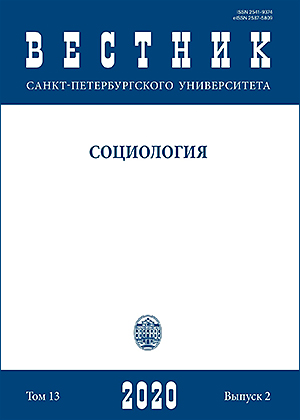О роли понятий «глобальный Север — Юг» в глобальной социологии
DOI:
https://doi.org/10.21638/spbu12.2020.201Аннотация
Статья посвящена понятиям «глобальный Север» и «глобальный Юг» и их истории в контексте (глобальной) социологии. Представлена историко-социологическая реконструкция существования этих терминов. Отслеживается процесс перехода понятий в глобальную социологию и их роль в рамках этого направления. Анализируется взаимосвязь категорий «третий мир», «глобальный Север» и «глобальный Юг», а также их влияние друг на друга. Рассмотрен процесс снижения актуальности использования термина «третий мир», а также его постепенная трансформация в «глобальный Юг». Кроме того, постулируется идея о том, что после перехода понятий в глобальную социологию они во многом утратили географическую коннотацию и оформились в качестве терминов эпистемологического характера. Исторически сложилось, что подобные понятия изначально носили несоциологический характер и чаще использовались в экономических, политических и политологических дискуссиях. Тем не менее, «Север»
и «Юг» появились в (глобальной) социологии относительно недавно, хронологически практически совпадают с началом дискуссии в рамках заявленного направления и с течением времени стали важными элементами в спорах относительно «социологии для одного мира». Дихотомия «глобальный Север — Юг» опосредует большое количество дискуссий в рамках глобальной социологии, связанных с претензиями «Юга» по поводу социологического доминирования «Севера», а также по поводу права «южных социологов» предлагать свои коренные концепты. Изучается связь социологов с той или иной категорией, которая в дискуссии о глобальной социологии играет существенную роль, являясь основой для использования большого спектра аргументов. Выдвигается идея о том, что географическая детерминированность носит умозрительный характер
и связана по большей части с идеологическими установками авторов, которые активно воспроизводятся в обсуждениях. Эта работа рассматривает два основных аспекта: во-первых, ретроспективный анализ оформления заявленных понятий, а во-вторых, их роль в рамках дискуссии о глобальной социологии.
Ключевые слова:
третий мир, глобальный Север, глобальный Юг, глобальная социология, линия Брандта
Скачивания
Библиографические ссылки
References
Загрузки
Опубликован
Как цитировать
Выпуск
Раздел
Лицензия
Статьи журнала «Вестник Санкт-Петербургского университета. Социология» находятся в открытом доступе и распространяются в соответствии с условиями Лицензионного Договора с Санкт-Петербургским государственным университетом, который бесплатно предоставляет авторам неограниченное распространение и самостоятельное архивирование.




